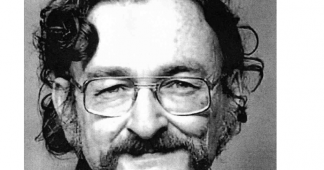May 12, 2020
Because of Jack Mundey the Sixties were different in Australia. The United States had Martin Luther King, Malcolm X, Mario Savio, Angela Davis, Noam Chomsky et al; France had red-haired anarcho-communist Daniel Cohn-Bendit; Germany Rudi Dutschke; Britain Tariq Ali and John Lennon. They were all activist intellectuals or students. That was typical of that moment in history. Only Australia had a figurehead who was a working-class hero. That was Jack Mundey, legendary leader of the builder’s labourers union, who died Sunday night aged 90.
Jack (born John Bernard) Mundey combined in himself all the leitmotifs of the Sixties. He was antiwar. He was anti-racist. He practised civil disobedience. He was a champion of the environment. He was a supporter of women’s and gay liberation. He advocated participatory democracy – it was called self-management then – everywhere. He introduced it and practised it in his union. He defended the idea of socialism with a human face and condemned the Russian-led invasion that snuffed out the experiment in a democratic socialism in Czechoslovakia in 1968.
And yes, he wore his hair long. He might have preferred a beer to a toke, but he had no problems with dope smoking. He was as much at home with libertarian bohemians (of which Sydney in the 1960s had more than its fair share) as with building workers.
Jack’s origins were radical petit bourgeois – his father was a small dairy farmer and lapsed Catholic – but he hailed from a classically Australian working class redoubt. He was from North Queensland, once known as the ‘Red North’, the only part of the country to ever elect a Communist Party MP – Fred Paterson back in the 1940s. He came to Sydney in the 1950s to play rugby league football for a club in the proletarian western suburbs, Parramatta, which he did for three seasons. He did that on Saturdays; during the week he worked as a builders labourer. He experienced his share of the vicissitudes of life early on; his first wife Stephanie died of a brain haemorrhage at age 22.
Naturally, for those days, Jack was a member of his union, the Builders Labourers Federation (BLF). It had become a sad excuse for a union but Jack was soon caught up in a reform drive which by the early 1960s had democratised a newly militant BLF. By 1970 he was its undisputed leader.
Along the way Jack had got communism (and met his life-long partner Judy Rimmer). It was a time when Australian communism was in turmoil, splitting three ways: pro-Chinese, pro-Moscow and independent. Jack joined the third tendency. He was always an activist, making his appearance as a public militant when he was arrested in one of the first anti-Vietnam War sit-down protests in 1965. (One of his fellow arrestees was Bill Brown, the father of future Greens senator Lee Rhiannon.)
A revolutionary in the ’hood
He became famous, of course, because of the Green Bans. This was the name given to the practice of the BLF in banning the employment of any builder’s labourers on contentious development projects. As almost all builder’s labourers were union members, a Green Ban would stop any development or demolition in its tracks. These Green Bans stopped the destruction of swathes of the Rocks and Woolloomooloo, the alienation of parts of Centennial Park and high-rise development on Sydney harbourside land.
It began in the most unlikely place, in refined haute bourgeois Hunters Hill, when in 1970 a bunch of female resident activists asked Jack and the BLF to help save Kelly’s Bush, an area of bushland on the harbour foreshore slated for an apartment development. What is often forgotten or overlooked in the celebration of the Green Ban movement is that it was a response to an upsurge of local community movements against over-development in the late 1960s and early 1970s in Sydney. Green Bans were typically imposed only after citizens in a neighbourhood called for them.
Green Bans came to Sydney University in 1973 during the student-staff strike in the Arts faculty over the attempt to prevent a course in marxism and feminism in the Philosophy Department. The threatened Green Ban acted more as a boost to morale rather than a blow against the university administration which was not then the mega-developer it was to become a generation later.
The Greens Bans left their historic mark in another way too. Petra Kelly, who was to become the ‘founding mother’, so to speak, of the world’s first Green Party in Germany, visited Australia in 1977 and met Jack Mundey and learned of his revolutionary ecological unionism. Back in Germany, Petra insisted on the name ‘Green’ – in conscious tribute to the Green Bans – for the party ex-Sixties radicals formed in 1980.
The Sixties came to an end in Australia with the fall of the Whitlam government in 1975. Coincidentally the Maoist federal leadership of the BLF sacked the Mundey-ite leadership of the BLF in New South Wales. As in the case of the Whitlam coup, there were protests but the mood for reform had soured and the federal intervention won out.
Jack was far from finished and was elected to the Sydney City Council in 1984 as part of a radical push. Throughout the 1980s Jack searched for ways to renew and expand the Communist Party but it carried too much baggage to ever be a realistic option.
By then Jack had been elected president of the Communist Party, but it was a ‘hospital pass’ as they say in rugby league, as the party was in terminal decline. When the Party disbanded in 1991 after the collapse of the Soviet Union, it was more than natural that Jack and Judy, after an initial hesitation, joined the Greens. After all, its politics were theirs. The four founding principles of the Greens – ecological sustainability, participatory democracy, social justice and peace and non-violence – summed up Jack Mundey’s basic credo.
The man of the Sixties had found his natural home. Right to the end he continued to support citizens in campaigns against the wrong kind of growth, whether it was coal mines, fracking, heritage demolitions or the expropriation of public land for upscale apartments. He’s gone, but his example remains. La lutte continue, as they say.
This appeared in honi soit, the student newspaper at Sydney University, http://honisoit.com/2020/05/vale-jack-mundey/











